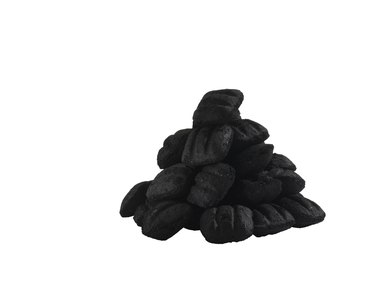 The ashes from burned coal are often used as fertilizer.
The ashes from burned coal are often used as fertilizer.
Fertilizers replenish nutrients in garden soil to nourish plants and encourage healthy growth. Different types of fertilizers provide different types of nourishment. Coal ash is one such fertilizer. Coal ash fertilizer is controversial among gardeners, with some supporting its use and others avoiding it. Arm yourself with information about coal ash fertilizer to determine if it is the best choice for your garden.
Video of the Day
What is Coal Ash?
Coal ash fertilizer is created by burning coal, often coal used as fuel for energy. There are two types of coal ash: fly ash and bottom ash. Bottom ash consists of the heavy grit at the bottom of the stove while fly ash consists of the little wispy ashes that float into the air. Fly ash is difficult to use from the home stove, as it is difficult to capture and takes a while to accumulate enough to be useful. Other types of coal ash you may use from your home include actual burned coal cinders from your stove or charcoal grill, as well as the ash from a charcoal grill. The coal ash fertilizer is obtained at home by simply scoopingit from your own coal-burning stove or grill.
Benefits
Coal ash fertilizer helps dry, hard-packed soil become easier to work and lighter in consistency. Coal ashes make the soil more efficient for plants, allowing roots to grow more quickly, air to move more freely and bacteria to work more easily. Coal ash does not add many nutrients to the soil as most fertilizers do, however it greatly improves the texture of the soil for working and ease of plant growth. Coal ash also raises the pH of acidic soil. As you gather it yourself, coal ash is an economical option for gardeners looking to improve soil texture.
Considerations
Coal ash is noted to contain dangerous substances, such as heavy metals. These heavy metals infiltrate the soil or compost mixed with coal ash. While the levels of toxic heavy metals in coal ash from a home stove are significantly lower than those from an industrial furnace, be aware that the metals are present in all types of coal ash. If this concerns you, skip coal ash as a fertilizer. As previously mentioned, coal ash offers no real nutritional value for your soil, only adding trace nutrients. If a true, nutrient-rich fertilizer is what your garden needs, you should look for a soil amendment other than coal ash.
Uses
Work coal ash into soil with a poor texture or that is too heavy for gardening. Mixing coal ash into your garden soil makes acidic soil more basic for plants that have trouble with the acid levels of your soil. Apply a layer of coal ash to the top of soil to act as a protective agent against worms or other insect pests that may harm your plants. The ash does not deter insects, but does make it more difficult for insects to reach plants.

